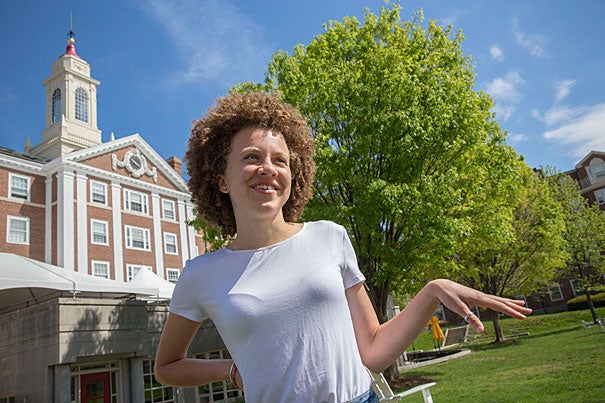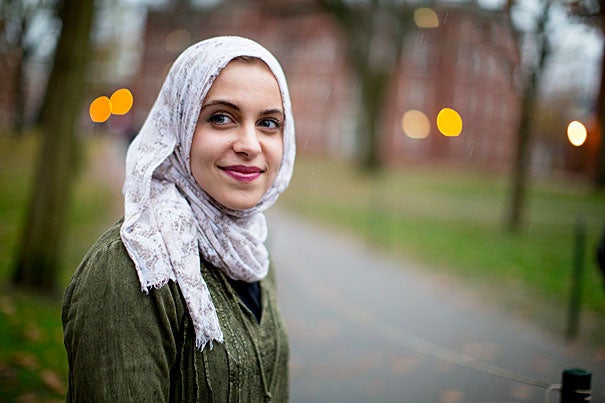Learning to let it fly
You can toss a mortarboard, but how about a Frisbee?
There are Frisbees flying around over the Quad lawn. It’s the first day that really feels like spring: warm and sunny outdoors with everyone making the most of it.
From his vantage point at a picnic table outside the Cabot House dining hall, Tyrik LaCruise ’17 mused, “Every time I see folks from freshman year, we mention how we can’t believe it’s been almost four years. It’s kind of surreal.
“I remember seeing seniors as a freshman and thinking they had everything figured out. And now I know that wasn’t true.”
For LaCruise and the rest of the Class of 2017, this is our last first day of spring as Harvard students. We’re graduating in a month, and it’s beginning to feel like a reality.
I remember coming to college four years ago having no idea what to expect, full of wonder and naïveté. And as clichéd as it sounds, I blinked, and the countless moments that have made up my time here have flown by. Reflecting with my friends, I was reminded again and again how much they have made my college experience truly marvelous.

LaCruise laughed, comfortable now where he had felt so threatened when he landed among those seemingly confident upperclassmen. A History & Literature concentrator, he is heading to Stanford Law in the fall, hoping one day to work in education law. He’s come a long way from the intensity of his high school environment—a prep school in the Bronx where he “never quit anything and was always going 100 miles per hour.” Over his time at Harvard, LaCruise began learning how to live a more balanced life. “Harvard forced me to realize that I could not keep doing what I was doing,” he said, reflecting on the difficult but ultimately beneficial decision to scale back his extracurricular activities on campus.
“The biggest things I’ve learned here are that asking for help is really important—in big ways and small ways—that it’s important to learn how to quit, and that you don’t have to say yes to everything,” Tyrik said. “Those are things we aren’t always taught, and it’s taken me a long time to accept them.”
Sarah Yeoh-Wang ’17 also learned to “slow down” and to invest in friendships. “I’ve gotten to really sink into playing the harp more. And I’ve met so many special people here. Each one of them has changed me, made me better,” she said. A dual enrolled student at New England Conservatory and Harvard studying, harp and English, respectively, Yeoh-Wang will be in Boston next year finishing her degree at NEC. She is a peer counselor with Contact (a student peer counseling organization), and throughout her undergraduate career has cultivated the skill of listening, citing it as one of the most enriching things she has gained at Harvard.
More like this
“How lucky am I,” she beams, “to get to know so many wonderful people! I think it’s really crucial to take joy in your peers, to celebrate your friends and other people. Everyone has something unique to offer.”
Looking back at her younger self, she reflects on how the freedom of college has let her structure her life in new ways, following her own inclinations instead of external expectations. “What I told my sister before she came to Harvard is that you don’t have to do anything. In high school, I always felt pressure to do something, what exactly I wasn’t sure, but pressure was there. But there’s nothing that really has to be done, so you might as well take a breath and figure out what you love to do, and do that.”
Yamen Abbas ’17 also reflects on feeling empowered to pursue his passions and learn from his peers at Harvard. A pre-med from Palestine studying Human Developmental and Regenerative Biology, Abbas had no experience studying life sciences when he fearlessly pursued HDRB freshman year. “It fascinated me because you’re studying life—you’re literally understanding what is alive. For me, science is how I see and have faith in a higher power, and it’s my privilege to be in a position where I can actually try to understand this thing that is so ridiculously complex and genuinely beautiful.”
With support from his peers and concentration advisor, Bill Anderson, Abbas navigated that first-year learning curve. In the fall, he’ll be working at a boutique healthcare and life sciences consulting firm, with future plans to pursue an M.D./Ph.D. program and become a physician-scientist.
Abbas credits his roommates with having the biggest impact on him “in a variety of subtle ways,” teaching him to see the good in people, notice the beauty of the natural world, and think more critically about human nature over the three years they’ve lived together. When I ask him what advice he’d give to incoming freshmen, he’s prepared: “Don’t put anyone on a pedestal, even professors. Be critical. A person can be great in a lot of ways but you don’t have to agree with them on everything. I think there’s danger in liking someone for one thing they stand for and focusing exclusively on that thing, because you might start believing things they say without thinking them through for yourself.”
As I approach May 25 with Tyrik, Sarah, Yamen, and the rest of the class, the most obscure moments can seem gilded with the anticipation of nostalgia. Shuttle rides, walking to class together, staying up too late, watching blossoms emerge from the long-frozen ground—they all become treasured moments as I sit in the Yard and realize this won’t be forever. And I agree with my friends that no institution can teach you the power of human tenderness. A high SAT score doesn’t mean you can find a life balance that works for you. Getting good grades doesn’t mean you know how to listen to another person. But being at Harvard has given many of us space to glean these most important lessons over our four brief years.
Nothing can outweigh the beauty and light that relationships here have brought to our lives. The challenges of an Ivy education have forced us all to grow, to learn how to slow down, to build friendships, and to be truly critical thinkers. While we’re all going off to do exciting new things next year, our achievements are not the whole point. Tyrik quoted from Maya Angelou as we sat reminiscing on the Quad lawn: “People will forget what you said, people will forget what you did, but people will never forget how you made them feel.”
Amanda Beattie is graduating on May 25 with a concentration in the comparative study of religion, focusing on religion and society, with a secondary in ethnicity, migration, and rights.





